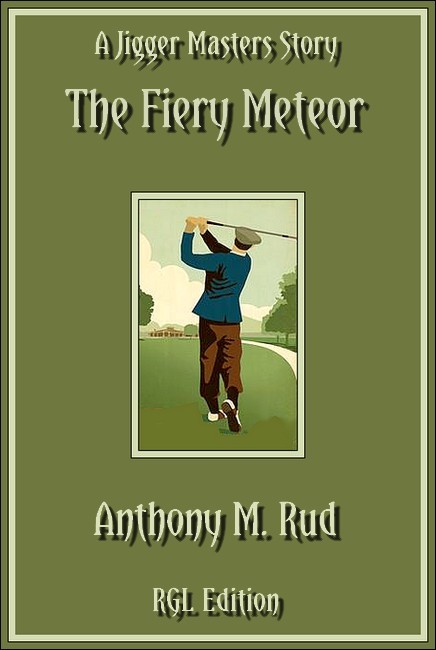
RGL e-Book©
Roy Glashan's Library
Non sibi sed omnibus
Go to Home Page
This work is out of copyright in countries with a copyright
period of 70 years or less, after the year of the author's death.
If it is under copyright in your country of residence,
do not download or redistribute this file.
Original content added by RGL (e.g., introductions, notes,
RGL covers) is proprietary and protected by copyright.

RGL e-Book©

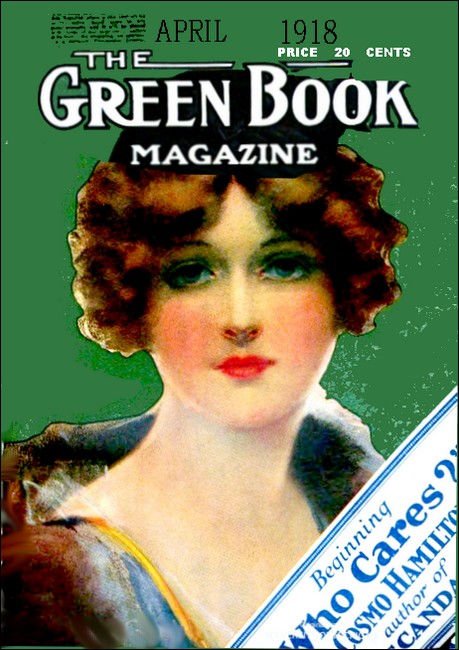
The Green Book Magazine, April 1918, with "The Fiery Meteor"
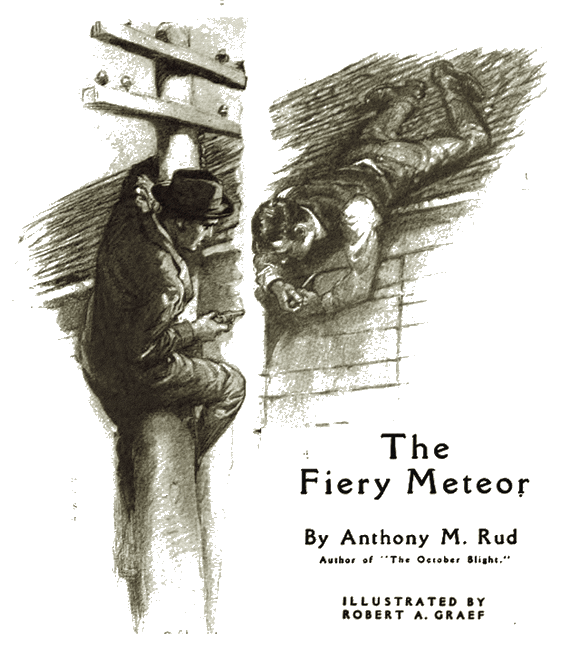
"Get out your gun!" he whispered. "If
there's anyone inside, get him first!"
Detective Masters, the most interesting sleuth since Sherlock Holmes, solves the mystery of a big munitions fire in a striking fashion.
DESPITE the unexpected promise Jigger Masters had made to
me on the occasion of our visit to Braithwaite Grange, when we
had made an end of the cloud of horror which hung over Crosby
Braithwaite, I really never expected my tall friend actually to
solicit my company on any of his adventures. Though I had been
handy on that one occasion, I had no belief that as astute an
individual as I knew him to be would have need of assistance
often.
He had taken to dropping in once or twice a day, however, seemingly for no reason except that of company. His office was on the third floor of the same building in which I had my studio; so the visits really required no explanation.
He never talked much, but would walk in silently, nod and then stretch his gaunt frame on a wicker couch at one side of my canvas. Sometimes he smoked, holding a long, black molasses-cured stogie at such an acute angle upward that as it burned down unevenly it must have warmed the end of his long hooked nose. More often he merely crossed his hands back of his shock of black, unkempt hair and watched me as I worked.
I say that he watched me, for his eyes usually were fastened upon me, but I know that the canvas before me, the stool on which I sat and the white gown in which I painted were merely parts of an unobtrusive setting which seemed in some peculiar fashion to assist his mental processes. As time went on, I knew this to be a fact, for a baffling dullness that looked for all the world like stupidity would creep into his expression: at these times he never answered or noticed me when I spoke. I became able to tell when he would answer and when he would not; when his eyes glazed, I painted on, really as much alone as if Masters had not been in the room.
On this Thursday morning he did not sit down. "Busy, Hoffman?" he inquired tersely, stopping in the doorway.
"No, not at all!" I answered, dropping my brushes as quickly as if I had been caught doing something despicable, and whirling around toward my visitor. Truth to tell, something of the timbre of Masters' rumbling voice informed me that this was no ordinary visit. I have always loved excitement, and since my experience with the man on the arsine murder-case, Masters had stood as the gate-keeper of my only chance at adventure.
"Read the papers this morning?" he asked.
"Ye-e-s," I answered slowly, trying to think of the features.
"See about the burning of the Dorgan piers and the two munition-carriers Halifax and Johnnie Jones?"
"Yes, some kind of a body from the heavens—a meteor or something—struck them, didn't it?" I inquired, trying to seem intelligent on the basis of a very scant perusal of the news.
Masters nodded, and an amused look crept into his blue eyes. "Yes, that was Basil Bennett's idea. One of the watchmen—we'll go to see him presently—declared that the fiery thing was a 'shootin'-star,' so Bennett, with the palpable camouflage of a tactful elephant, directed the papers not to mention the possibility of the fire being of incendiary origin. That's why all the Sunday supplement stories appear on the first page to-day.
"Of course, so long as Bennett has started it in this fashion, we shall not contradict him publicly—yet. For the life of me I can't see, though, why there should be the slightest deception in the story, except for such browsers as yourself, who merely seize a few tufts of news at the breakfast-table to digest at leisure."
"No, the criminals won't be fooled for an instant," I replied. "What are you going to do about it?"
"I'm going to take you with me on a little trip through the sky to see if we cannot locate the orbit of our heavenly visitor." Masters' tone was jocular, but his eyes were earnest.
"Whoopee!" I cried, and my dressing-gown was off in an instant. "Shall I carry an ash-stand?"
"No." He smiled. "That was a good weapon against Mrs. Braithwaite, but it has had its day. Have you a dependable revolver?"
"Just that old single-action cannon." I pointed to the wall above the fireplace where my forty-five hung in a holster. "There's nothing fancy about it, but I can hit an orange at thirty feet with it."
"Yes, with one bullet!" Masters' tone condemned my old friend of nights on the Montmartre to the discard. "Here, pocket this!" He drew a black thirty-eight automatic from his pocket and handed it to me.
Then, as soon as I had donned my jacket, Masters led the way to the street and made for the subway. "We'll interview one of the guards, first of all," he informed me. "You know, ever since the declaration of war, patrols of armed guards have been kept on the munitions-piers. Most of them are being held at the Tombs."
A short time later we were ushered into a cell in that somber edifice. A man, bandaged about the head and neck and with one arm in a sling, reclined upon the prison cot. The jailer introduced us as Government investigators and urged the prisoner to tell us all he could tell about the catastrophe. The man sat up.
"Did this fiery thing that burned you seem like a meteor from the skies?" inquired Masters without preamble.
The chap on the bed seemed slow to answer. So much of his face was swathed that it was difficult to guess his mental processes. "Gosh, I don't know!" he said finally. "I ain't never seen shootin'-stars close up, and you believe me, I don't want to see no more!"
"Well, can you tell us really just what occurred? Some people don't seem to believe it was from the sky at all, and we just want to make sure. By the way, Murphy, what nationality are you?"
The brows between the bandages scowled. "Kidding me, ain't you?" he retorted ironically.
"Well, I suspect you are of Irish extraction, of course," Masters replied. "But were you born in the country?"
"Yeh."
"Lived all your life here?"
"In little old New York."
"Any Liberty bonds?"
"One. I ain't got it all paid for yet."
"Well, I guess you're all right, Murphy. Tell us about the shooting-star."
The other leaned forward. "There ain't so much I can tell," he began, "but what there was of it was darned hot stuff for me! You see, Doolan, Shinner and me had the job of guardin' the shore end of Number Four Pier—that was the one that the Johnnie Jones was tied to. We had two hours on and then four hours off, right along, twenty-four hours a day. Doolan had from twelve till two in the mornin', and I followed him. It was just about time for me to wake Shinner. I was thinkin' about walkin' over to the bunk-house that minute, when all of a sudden I hears a clank and a bang, kinda far off, like. I stops and turns my head, and right that second the whole sky seemed to catch fire, and gobs of fire began splashing down all around me."
"Could you see the meteor?" interrupted Masters eagerly.
"Could I see it?" mimicked the other, with scornful emphasis. "I couldn't see nothin' else! It was just like as if somebody had torn the sun loose and it was bearin' down, losin' hunks of liquid sun all the way! It was so bright and so danged hot that you couldn't look at it straight, though."
"Did it make any noise?"
"Noise? Gosh, it whistled like fifty steam injines, all shootin' out steam at one time!"
I glanced at Masters' face in time to see the peculiar dullness creeping into his eyes. Murphy saw this also, and interpreted it as meaning that the interview was about over. He started to recline again on the cot.
"Just a minute!" Masters checked the Irishman. "You say that this thing came on with a clank and a bang?" The expression of my friend had altered as quickly as it had changed previously.
"No-o," said our informant slowly. "I heard them first. I don't think there was any noise of that kind after, though I don't rightly know, 'cause there was so much whistling."
"I see. Did you see anything about the meteor that would explain the whistling?"
"Nope—that is—well, the darned thing seemed to be spinnin' like a great big top, and you know some of these here tops that kids play with whistle."
Masters sat up straight in his chair. "Spinning!" he exclaimed.
"Well, I don't know as I'd call it that," answered Murphy uneasily. "I wouldn't like to swear to that on the stand. It kinda looked that way to me, 'cause the fire it shot out seemed to curve, kinda, like water from a hose when you sweep the end around sudden-like."
Masters nodded, and was silent an instant. I would have liked to have him probe Murphy further in regard to this interesting phenomenon, but he seemed to take the spinning quite as a matter-of-fact characteristic of meteors.
"Did the thing seem to drop straight down from the sky?" he asked.
Murphy shook his head decidedly, seeming relieved that the subject was changed. "Nope!" he returned. "It was headin' northeast, or thereabouts, and the big funny thing I seen about it was that it didn't seem to be a darn bit in a hurry to come down! All shootin'-stars I ever seen before came down and went out quick."
"Yes? How long did it seem to stay in the air?"
"About five minutes—still, I guess it wasn't that long," Murphy corrected himself quickly. "You see, it didn't come very near to me, but I got some of it just the same. It threw fire all over everything, and some of it splashed on me, and it seemed a long time. I don't just know how long. I wouldn't like to swear."
"Cheer up. You probably won't have to do any swearing," returned Masters to the cautious Celt. "Did you notice what the fire seemed like that fell on you?"
"Like hell-fire!" returned Murphy with conviction. "It stunk like brimstone, but it wasn't solid when it hit me. It was all liquid and burning like a busted gasoline tank."
"Flammenwerfer," I muttered, unconscious of the fact that I was voicing my thought aloud.
Masters fixed me with a scowl instantly. "All right, Murphy," he said, rising, and shaking hands with the watchman. "I guess that will be all for now. Thanks!"
WHEN we were on the way out, Masters seized my arm firmly.
"Your guess may have something in it," he said sternly, "but you
must not talk in your sleep any more!"
"I'm sorry," I said, "but I don't think that chap understands German, anyway."
Masters twisted his wide mouth into a grim smile. "No, I don't believe he does now, either. But you can count on it, that whoever is really mixed up in this shooting-star stuff does understand German!"
Then in silence we made our way down to the water-front where the big array of Dorgan piers had stood just two days previously. Fire engines and tugs still were pumping water on the smoking ruins, and a tangle of fire-hose made us keep close watch of our footing.
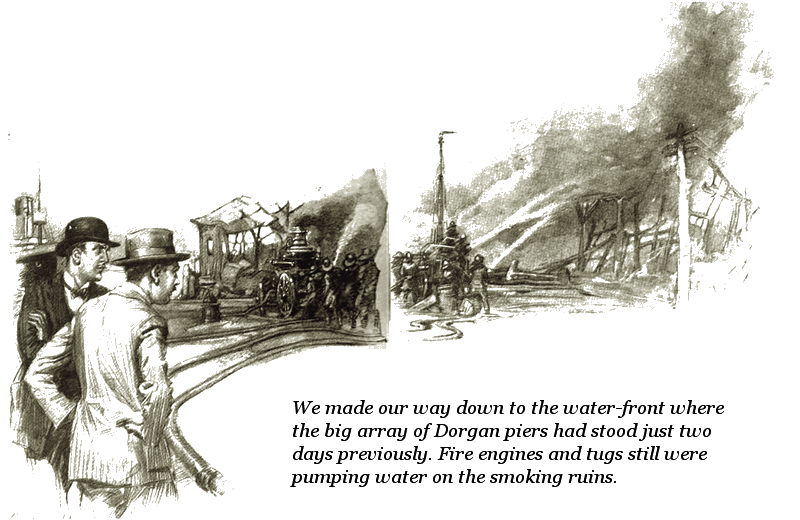
All the huge piles of munitions were consumed, the piers themselves surrendering to the fire-monster also, except the two ends of each, which vainly seemed to be trying to support the wasted and charred middles.
A little group of men in rubber boots was scurrying about among the ruins on Pier Number Four which we visited. Masters walked up and accosted one who seemed to be in charge. "Any luck?" he said.
"No, not a trace!" was the disgusted answer. "Say, do you know, I don't think we'll find much," he went on, leaning toward my friend. "I don't think there's much to find!"
"No?" Masters' tone contained a perfect inflection of mild surprise.
"No!" asserted the other darkly. "Oleson—you know, he was watching over on Pier One—says that the thing blew up, and never came down to the ground at all!"
Masters pursed his lips in a low whistle and turned in my direction. I thought for an instant he was going to wink at me, but instead I saw that he was scanning the outlines of the big warehouses on the water-front. "Well, I don't think you'll find much left if that's the case, Leders," he said, and walked back with me to the shore.
"What the deuce kind of a machine could that have been?" I asked in what must have been an awe-struck tone.
Masters shrugged his shoulders. "In this game one can judge the future only by the future," he said. "If criminals and conspirators stuck always to the beaten paths, there would be little use for me. For that reason I look forward always; I rely on the police and the regular detective bureaus to work the rule of thumb as far as it will work. When they give up, I am morally certain that there is some new factor in the situation."
"And are you often disappointed?"
"Rarely. The police net has become so efficient in our big cities that even most intelligent criminals fall into it. But now and then comes a real genius like the man back of this."
"Then you are positive that this is a war-plot?"
"Absolutely. Meteors don't throw off naphtha, sulphur and niter; nor do they spin like tops; nor do they stay in the air for any appreciable periods. Yes, I know a German is behind this; in fact, I can almost say without investigating further that I know what German!"
"Good heavens, how?"
"Well, this machine is a marvel of mechanical ingenuity; as a matter of fact, I do not believe that I even can describe it now. However, it accomplished its purpose thoroughly; it is a high development of Flammenwerfer, a German invention, and it was used in attacking Allied shipping and munitions destined for the Allies. Therefore it doubtless is German, or at least the work of a German sympathizer who is willing to risk his all to help the German cause. So far as I know there are just three Teutons in this country who have laboratories equipped well enough to turn out a machine of this description. Well, I do not believe we shall be long in the dark!"
WITH this he turned sharply to the right. We had been walking
south along the water-front, and had got approximately fifty feet
beyond Pier Number One. Masters led me between the walls of two
huge warehouses and back into a lateral passage behind the
outside building.
This passage was narrow, ill-smelling with the accumulated filth of a generation, and the wooden walls rising on each side of us were blank and totally without windows. Masters seemed most interested in the building just to the west.
We walked slowly along the alley, scrutinizing the bare walls, I did not know for what. Suddenly Masters gave an exclamation of satisfaction. "See up there?" he queried, pointing upward at what looked like only a crack running horizontally.
"Yes."
"Well, how can we get up?"
"How about the front door?"
Masters smiled grimly. "Are you well satisfied with your life-insurance?" he asked. "I don't believe in walking into any traps I can avoid. Guess I'll try that telephone-pole."
With that he cast aside his coat, hat and gloves and mounted a wooden pole which had been left standing, bare of wires, after the latter had been run underground. From this he managed to clamber to the broad, sloping roof, and stretched himself out prone upon the rotten shingles, with his face and arms dangling over the edge.
He beckoned me to climb the pole. When I had got to a point opposite the crack, he motioned for me to stop. "Get out your gun!" he whispered. "If there's anyone inside, get him first!"
A few curious apprehensions stirred within me; it seemed to me rather that Masters and I were the criminals, not the men we were seeking. It all seemed so much like housebreaking.
I had little time for philosophizing, though. Masters, once he saw that I was stationed, drew a jimmy from his hip pocket and began work on the crack. I noted now that the cracks were four in number. Two extended laterally, while two were perpendicular, outlining what might be a gigantic door some ten feet wide by six in height. The moment I realized this, most of my apprehensions fled, for a concealed door, thirty feet from the ground, and looking out only on the peak of the roof of the warehouse nearer to the water, could have no legitimate purpose.
THE big door swung open noiselessly. This surprised me, for I
had expected a creaking or a straining of locks, or some other
indication, but there was none. A black-shirted arm reached out
of the semidarkness to catch the door, the owner doubtless
thinking it had swung open by itself. As quickly the arm
withdrew, and I saw a shadowy form within moving backward.
Almost instantly I fired, and the man dropped with a yell of pain.
Masters waited no longer. Crawling to the edge, he swung down on the door. The hinges strained under his weight, and I expected to see him pitch to the ground, but by some miracle they held. He scrambled in the wide opening, and then I could not see him.
Feeling that I could be of no more assistance to him there, I hastily descended the pole, and made my way around the warehouse to the door in front. Just as I arrived, a bareheaded man, heavy-set and with a pair of blue, popping eyes, burst through. I shot, but the bullet either missed or was deflected without damage, for he sprang straight in my direction, his arms wide for a grapple. I saw my chance; it scarcely could have been more simple. I met his rush with a straight-arm jab flush in his mouth. His head shot back like a tenpin hit by a bowling-ball, and he slipped to his knees, then slumped forward on his face, completely out.
I knew he would be there for several minutes, so I rushed in. "Masters!" I yelled. "Where are you?"
"Here!" came the deep voice from above-stairs. "Coming down!"
"You got that chap upstairs, all right! I wish it had been Lilienthal himself. It was only a helper."
"Maybe this one is the chap you are after," I said, indicating my unconscious foe. "He came running out."
"Oh!" Masters turned like a flash and made his way into the building again, this time hurrying into the big office on the ground floor. I followed, wondering what else there was to do.
The office was empty. Masters was baffled for a second; then, throwing aside a bookcase which seemed to be built in, he hurried into an inner room quite concealed.
A strong stench of burning powder smote our nostrils! The moment I stuck my head in, I saw Jigger bending down in one corner, striving frantically to extinguish a lighted fuse which had burned itself to within a fraction of an inch of a big tublike contrivance which I could not distinguish clearly in the smoky atmosphere.
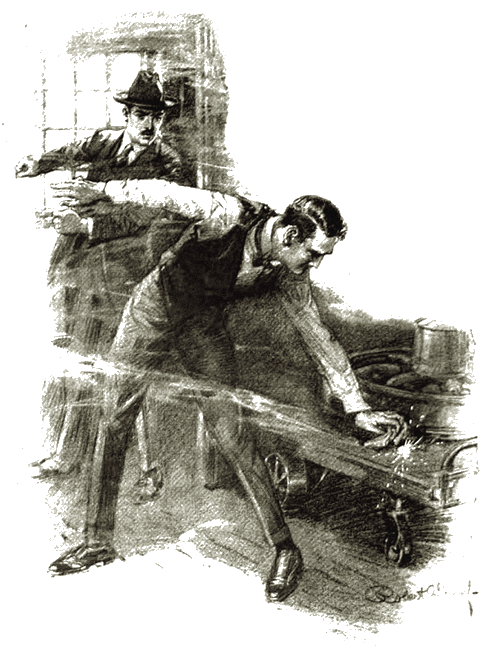
I saw Jigger striving frantically to extinguish a lighted fuse.
HE succeeded, barely in time. In fact, he was not at all sure
that the thing was not going to explode anyway, and so he hurried
me out into the open air again and waited. "That was a narrower
escape than I imagine you know," he said with a sigh of relief
after several moments had elapsed. He bent down, clicked
handcuffs on my victim and with my assistance dragged the man
into the inner office. Then he sat down and phoned Basil
Bennett.
The big chief of police arrived five minutes later with a squad of policemen.
"I suppose he'll get a chance to rest, at least until this war is over," I ventured, breaking the silence as the man was taken out to the wagon.
"The chair!" retorted Bennett laconically. "Two watchmen were burned to death in the fire!"
"And now, before you go, Chief, I want you to dismiss your men and come here an instant. There is a little apparatus here which will interest you—and the chief of the ordnance board—immensely, I think."
Bennett stepped forward, and at that moment Masters seized a wire rope at one corner of the room. Pulling on this, he made the whole room rise beneath our feet! The room was simply an elevator.
In a moment we had arrived at the floor above, and the light from the open door shone in more brightly; one wall, that on the side of the door, had been taken out entirely.
"Here it all is, Chief," said Masters, with just a touch of pride. "That's the machine that burned the piers and the two ships!"
"What on earth?" asked Bennett, puzzled. I felt like echoing his sentiments, for on a huge truck lay one of the queerest devices the mind of man ever conceived. In appearance it seemed to be a huge wheel, for it had a rim somewhat like a wagon-tire, probably of steel. In place of an ordinary hub was a metal tub from which the "spokes"—as I shall call them for want of a better descriptive term—radiated. These spokes resembled huge thermos bottles, except that they too were of metal, and that they each possessed what appeared to be a nozzle or faucet, turned one side, and inclined down.
"Well, there's no wonder you are puzzled," said Masters, smiling. "I knew that the machine must be something like this, but I must admit that I cannot explain the mechanism satisfactorily myself as yet. In principle, of course, it is a gigantic apparatus for throwing liquid fire—the same weapon which the Germans use in assaulting trenches. But it is a great deal more than that; in fact, it is also an ingenious airplane and a bomb of terrific force!
"You see this center hub, or tub, or whatever you wish to call it? Well, I have no doubt that right this instant that hub contains forty or fifty pounds of trinitrotoluol, the deadliest and most destructive of all the explosives now in use in warfare. I'll explain what that is for in a moment.
"Each of these arms, radiating from the center, is a hollow container carrying a load of liquid fire under high pressure. On the bottom of each of these is a broad fin—see, it is almost like the blade of an airplane propeller. The idea is that when this monster has all its tubes shooting out the burning, expanding gases and liquids from the nozzles, the high pressure exerted on the atmosphere makes the wheel revolve at enormous speed—speed probably greater than that attained by any other human machine!
"The revolution of the wheel, which is a great deal like the pin-wheels we used to fire off on the nights of Fourth of July, exerts a tremendous lifting force on the air in which it travels, through the medium of these propellers, or fins, on the bottom of the thermos-bottle spokes. This keeps the machine from falling to the ground until all the liquid fire is exhausted."
"But what is the metal rim for?" I queried, reaching down my hand to touch it.
"Stop!" shouted Masters, just in time to prevent my hand from seizing it. "Lord! You almost gave me heart-failure!" he said, heaving a sigh of relief. "That rim is arranged with an electrical apparatus in some way so that when the whole mechanism is started whirling, centrifugal force releases it. It in turn then opens the cocks of the liquid-fire containers, and sets them alight by an electric spark in front of each of the nozzles."
"We would have been cooked in a short time!" I answered, starting back from the horrid thing.
"Yes, indeed!"
"But I don't understand just how this apparatus gets up into the air, and what that tub or bomb at the center is for," said Bennett.
"Look here!" directed Masters, turning back toward the wide door through which he had entered so unceremoniously. The floor immediately back of this door was inclined backward and down, and sides were added, making a gigantic skid. At the rear of this was a huge catapult with a number of heavy springs, and a lever for setting the latter.
"Lilienthal simply had that catapult set. Then he placed the big fire-wheel on this skid so it would be acted upon by the catapult. When all was ready, he let go the trigger. The wheel sailed out just over that roof in front of us. The moment it got over there, right above Pier One, the liquid fire caught, and from then on the wheel soared, shooting its contents over a diameter of about two hundred yards. The original impetus was sufficient to carry it across the four piers."
"And the tub-bomb?"
Masters smiled grimly. "That almost spelled Finis for Hoffman and myself. I knew that Lilienthal probably would be making another of the machines, so that when I found he was in the building—Hoffman knocked him down just as he was leaving—I knew that he would have some method of destroying his work rather than have it fall into the hands of the United States' authorities. As a matter of fact, I got here in just the nick of time! See this burned fuse?" We all nodded assent. "Well, in five seconds more it would have reached the trinitrotoluol, or whatever his explosive is, and all the buildings around here would have been blown up!
"Lilienthal was a clever one, all right! The real idea of the tub-bomb was to light this fuse just as the wheel was started. Then it would explode just about the time the liquid fire was exhausted, destroying the mechanism completely so that no one could be certain what it was like."
Roy Glashan's Library
Non sibi sed omnibus
Go to Home Page
This work is out of copyright in countries with a copyright
period of 70 years or less, after the year of the author's death.
If it is under copyright in your country of residence,
do not download or redistribute this file.
Original content added by RGL (e.g., introductions, notes,
RGL covers) is proprietary and protected by copyright.